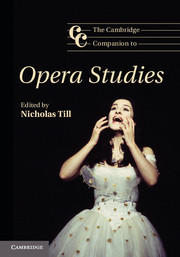Book contents
- Frontmatter
- Contents
- Contributors
- Acknowledgements
- Introduction: opera studies today
- Part One Institutions
- Part Two Constituents
- Part Three Forms
- 8 The dramaturgy of opera
- 9 Genre and poetics
- 10 The operatic work: texts, performances, receptions and repertories
- Part Four Issues
- Further reading
- Index
- References
9 - Genre and poetics
from Part Three - Forms
Published online by Cambridge University Press: 05 December 2012
- Frontmatter
- Contents
- Contributors
- Acknowledgements
- Introduction: opera studies today
- Part One Institutions
- Part Two Constituents
- Part Three Forms
- 8 The dramaturgy of opera
- 9 Genre and poetics
- 10 The operatic work: texts, performances, receptions and repertories
- Part Four Issues
- Further reading
- Index
- References
Summary
The question of genre might appear more attuned to the interests of the natural sciences than to opera studies: to the need to identify a specimen in terms of genus and species, and to name and list each item into ordered sets, with thoroughness and precision. And yet such laborious collecting and classifying is unavoidable in the realm of opera too, as attested by the copious and disparate typologies offered by musicological dictionaries. So, what is opera in terms of genre? Since the concept of genre refers quite simply to kind or sort, then we have to ask first of all what sort of art (and craft) is opera? How does it define itself: as a kind of music? Or, perhaps, as a kind of theatre? Then, a second question emerges as soon as we try to account for a specific work from the past, or if we decide to compose or produce an opera: which sort of opera is this opera?
These basic questions already invoke a theory of opera (or what historically has been described as a ‘poetics’, after Aristotle’s own genre-defining text of that name on literary and dramatic theory). Genre, in other words, is a term that pertains to abstract conceptualizations of opera whose coordinates may not necessarily coincide with specific cases. Rather than retracing the exhaustive paths of musicological dictionaries in enumerating all the genres of opera, these pages will instead offer a transversal historiographical and theoretical account. Also, rather than adopting the literary discourse of genre theory in a search for how it can be relevant to opera, this chapter will pose the problem the other way around and ask what opera can do for genre theory. The first section returns to the questions above in order to introduce theoretical issues invoked by the term ‘genre’. This is followed by a historiographical outline of generic definitions in opera. The closing section returns to theoretical discourse on genre and maps out some possible intersections between concerns typical to opera studies and their relevance more broadly for genre theory, in particular in relation to performance.
- Type
- Chapter
- Information
- The Cambridge Companion to Opera Studies , pp. 202 - 224Publisher: Cambridge University PressPrint publication year: 2012
References
- 5
- Cited by

